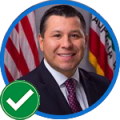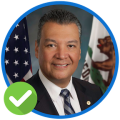Reelect State Assemblymember Eduardo Garcia to keep AD-36 on the right track for progress.
The Position
State assemblymembers represent and advocate for the needs of their district constituents at the California State Capitol. They are responsible for creating, debating, and voting on legislation that addresses issues within their district.
The California State Assembly has 80 districts. Each represents a population of at least 465,000 Californians. Representatives are elected to the Assembly for a two-year term. Every two years, all 80 seats are subject to election. Members elected before 2012 are restricted to three two-year terms (six years) in the Assembly. Those elected in or after 2012 are allowed to serve 12 years total across both the state Senate or the Assembly. This term, Democrats currently hold a two-thirds supermajority of 56 seats in the California State Assembly, while Republicans hold 19 seats. One seat is held by an Independent and four seats are currently vacant.
The District
California’s 36th Assembly District includes parts of Riverview and San Bernardino Counties and all of Imperial County. Republicans typically hold this district. Of the registered voters in this district, 27% are Republican and 44% are Democrat, and the district’s demographic breakdown is 59% Latino, 3% Asian, and 4% Black. After the 2021 redistricting process, AD-36 is 8% less Democratic than it was during the 2020 general election cycle. The most recent election results show that AD-36 voted for Joe Biden for president in 2020 by 15 points and Gavin Newsom for governor in 2018 by 9 points.
The Race
There are three candidates running for this seat, including Democrat Incumbent Representative Eduardo Garcia, Democrat Marlon Ware, and Republican Ian Weeks. Assm. Garcia’s campaign has raised $521,000, and has received donations from police, fossil fuel, and corporate PAC interests. Weeks’s campaign has raised $15,000, primarily from individual donors. Ware’s campaign has not submitted any fundraising receipts to the Secretary of State.
The Recommendation
Assm. Garcia, a career public servant, is a lifelong resident of the Coachella Valley. Prior to redistricting, Assm. Garcia represents AD-56 and won his 2020 reelection to that seat against Republican America Figueroa by 28 points.
Assm. Garcia’s priorities for AD-56 this year have included 56 bills about energy, water, education, and workforce development. Of these, four have been chaptered into law, one has been vetoed, 16 have died, and the rest are currently in committee. He currently sits on four committees, including Appropriations, Communications and Conveyance, and Governmental Organization. He serves as chair of the Utilities and Energy Committee, and the Select Committee on California’s Lithium Economy. He scores a CS of 84 out of 100 on Courage Score, our annual analysis of legislators’ progressive voting records. Based on our Courage Score analysis, Assm. Garcia has supported some progressive bills that made it to a vote. That said, Assm. Garcia did not cast a vote on bills related to single-use plastics in online retailing, and the expunging or sealing of criminal records for those who have completed their sentences.
Prior to his election to the State Assembly in 2014, Assm. Garcia served for ten years in the Coachella City Council, including a turn as mayor. He was the first person to be elected to the mayor’s seat. He is a longtime supporter of environmental and economic development for the Coachella Valley. Assm. Garcia has authored bills related to the restoration of the Salton Sea, and bills related to providing financial support to small businesses and workforce-development training to local residents.
Assm. Garcia has received donations from a variety of problematic funders, including Sempra Energy, AT&T, Exxon Mobil Corporation, California Association of Highway Patrolmen PAC, and Berkshire Hathaway Energy. Given Assm. Garcia’s connection to these groups, it is important that voters continue to hold him accountable to ensure that his legislative efforts remain in the best interest of constituents instead of donors. Based on our analysis, Assm. Garcia’s track record and policy positions demonstrate that he will continue to be a leader for the constituents of AD-36 and will govern effectively in the best interest of this diverse district.
Reelect State Assemblymember Eduardo Garcia to keep AD-36 on the right track for progress.
The Position
State assemblymembers represent and advocate for the needs of their district constituents at the California State Capitol. They are responsible for creating, debating, and voting on legislation that addresses issues within their district.
The California State Assembly has 80 districts. Each represents a population of at least 465,000 Californians. Representatives are elected to the Assembly for a two-year term. Every two years, all 80 seats are subject to election. Members elected before 2012 are restricted to three two-year terms (six years) in the Assembly. Those elected in or after 2012 are allowed to serve 12 years total across both the state Senate or the Assembly. This term, Democrats currently hold a two-thirds supermajority of 56 seats in the California State Assembly, while Republicans hold 19 seats. One seat is held by an Independent and four seats are currently vacant.
The District
California’s 36th Assembly District includes parts of Riverview and San Bernardino Counties and all of Imperial County. Republicans typically hold this district. Of the registered voters in this district, 27% are Republican and 44% are Democrat, and the district’s demographic breakdown is 59% Latino, 3% Asian, and 4% Black. After the 2021 redistricting process, AD-36 is 8% less Democratic than it was during the 2020 general election cycle. The most recent election results show that AD-36 voted for Joe Biden for president in 2020 by 15 points and Gavin Newsom for governor in 2018 by 9 points.
The Race
There are three candidates running for this seat, including Democrat Incumbent Representative Eduardo Garcia, Democrat Marlon Ware, and Republican Ian Weeks. Assm. Garcia’s campaign has raised $521,000, and has received donations from police, fossil fuel, and corporate PAC interests. Weeks’s campaign has raised $15,000, primarily from individual donors. Ware’s campaign has not submitted any fundraising receipts to the Secretary of State.
The Recommendation
Assm. Garcia, a career public servant, is a lifelong resident of the Coachella Valley. Prior to redistricting, Assm. Garcia represents AD-56 and won his 2020 reelection to that seat against Republican America Figueroa by 28 points.
Assm. Garcia’s priorities for AD-56 this year have included 56 bills about energy, water, education, and workforce development. Of these, four have been chaptered into law, one has been vetoed, 16 have died, and the rest are currently in committee. He currently sits on four committees, including Appropriations, Communications and Conveyance, and Governmental Organization. He serves as chair of the Utilities and Energy Committee, and the Select Committee on California’s Lithium Economy. He scores a CS of 84 out of 100 on Courage Score, our annual analysis of legislators’ progressive voting records. Based on our Courage Score analysis, Assm. Garcia has supported some progressive bills that made it to a vote. That said, Assm. Garcia did not cast a vote on bills related to single-use plastics in online retailing, and the expunging or sealing of criminal records for those who have completed their sentences.
Prior to his election to the State Assembly in 2014, Assm. Garcia served for ten years in the Coachella City Council, including a turn as mayor. He was the first person to be elected to the mayor’s seat. He is a longtime supporter of environmental and economic development for the Coachella Valley. Assm. Garcia has authored bills related to the restoration of the Salton Sea, and bills related to providing financial support to small businesses and workforce-development training to local residents.
Assm. Garcia has received donations from a variety of problematic funders, including Sempra Energy, AT&T, Exxon Mobil Corporation, California Association of Highway Patrolmen PAC, and Berkshire Hathaway Energy. Given Assm. Garcia’s connection to these groups, it is important that voters continue to hold him accountable to ensure that his legislative efforts remain in the best interest of constituents instead of donors. Based on our analysis, Assm. Garcia’s track record and policy positions demonstrate that he will continue to be a leader for the constituents of AD-36 and will govern effectively in the best interest of this diverse district.










